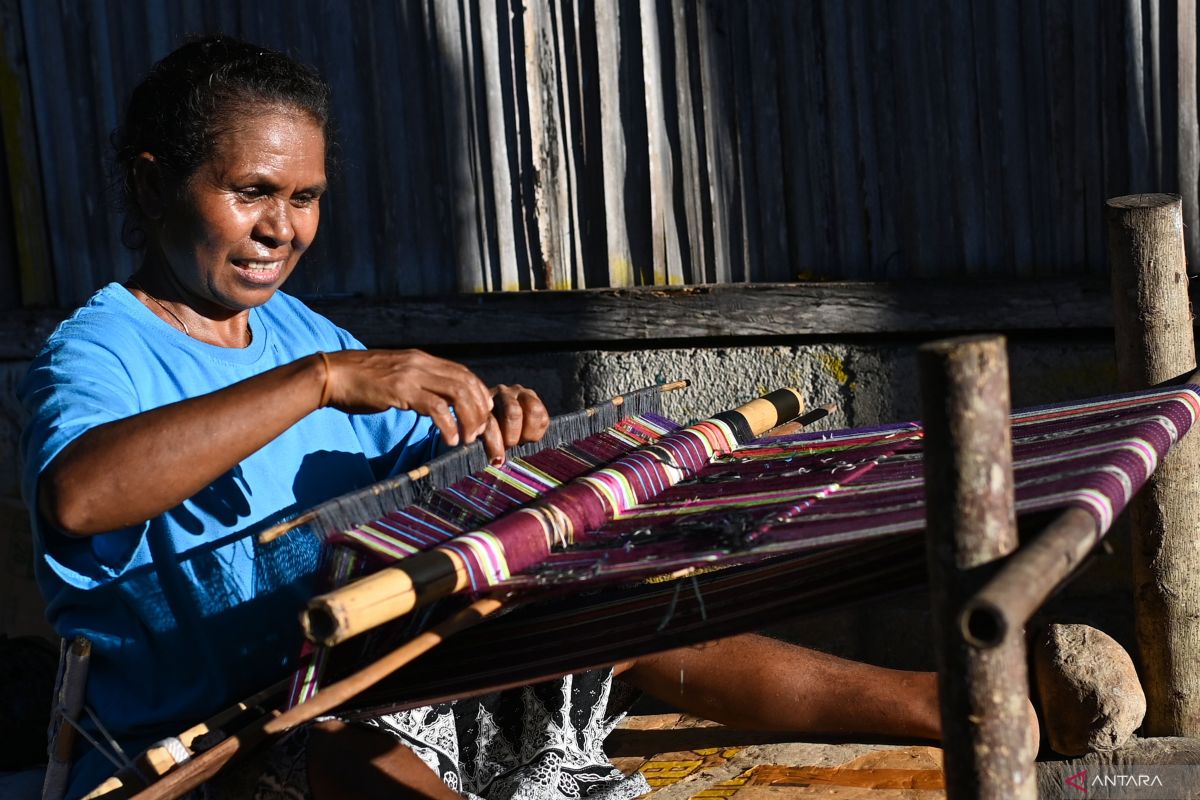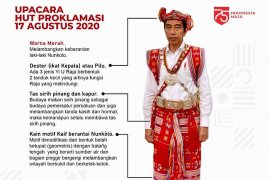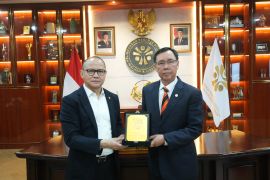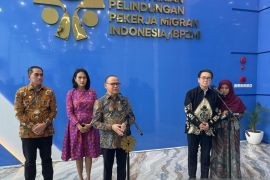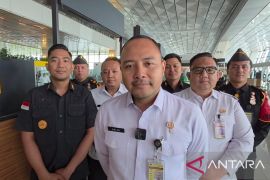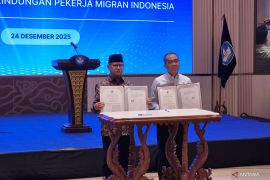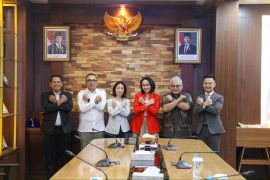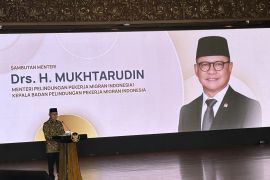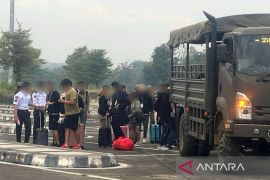In the middle of a not-too-hot day, Regina Siki is busy operating a wooden loom.
She weaves the threads strand by strand to form a beautiful traditional cloth of the Bumi Flobamora, another name for East Nusa Tenggara.
"This will take about another week to finish," she said while operating the loom provided by the Ministry of Social Affairs.
The cloth, priced at Rp500 thousand per sheet, will be sold to one of her neighbors, who has ordered it in advance for attributes during a celebration.
Occasionally, the middle-aged woman has to stop weaving when a customer wants to shop at her vegetable stall. That has been Regina's daily activity for the past year.
Apart from selling at the vegetable stall she built in 2012, Regina is currently also involved in the creative economy by making East Nusa Tenggara's typical woven cloth.
Before 2012, Regina had never given thought to seeking a living in her hometown, like now.
Due to the lack of job opportunities for those with low education, the dream of becoming a migrant worker, especially in Malaysia, was common among the people of Kefamenanu, including Regina.
At that time, the lure of earning a lot of money as a migrant worker drew Regina and her fellow residents.
Apparently, the promise of a big salary as a domestic helper in Malaysia was just a bluff from labor brokers. Instead of earning a lot of money, Regina was treated inhumanely, and her salary was withheld by her employer.
Even after two years of working, she only received Rp4 million. In fact, her total salary for two years as a domestic worker should have been no less than Rp27 million.
Regina's employer deducted a major chunk of her salary to cover her medical expenses, as she was often in and out of the hospital.
Regina's frequent illness was not without reason. How could it not be that during the two years of working in Penang, Malaysia, the mother of five children received a bedroom without a mattress and small portions of food?
Unfortunately, Regina's working hours were also uncertain.
Regina was bogged down by thoughts after no longer being able to put up with her employer's bad treatment, coupled with being overwhelmed by homesickness.
Finally, she decided to quit working in Malaysia. She thought it was better to live a hard life in her hometown instead of leading a difficult life in another country and being cheated by her employer.
Rise
After returning from Malaysia, Regina worked odd jobs with uncertain income. Finally, she decided to open a vegetable stall with the remaining salary as a domestic worker in Malaysia and the rest of her assets.
Luck slowly began to favor her. As more and more customers started trickling in, Regina's vegetable stall turnover continued to grow. From the stall's income, she could send her five children to school.
Eleven years later, God's grace greeted Regina and her family again through the Ministry of Social Affairs. Selected as one of the beneficiaries of the empowerment program for former victims of human trafficking and problematic Indonesian migrant workers, she received assistance of around Rp13 million.
She channeled the money to develop the stall and realize her old dream of becoming a weaver. Since her teen years, Regina had a talent for weaving, but due to limited capital, she could not realize it as a business.
Apart from fulfilling her old dream, Regina also sent her two sons to college with the proceeds from the sales of her woven cloth.
Sharing a similar story as Regina, Yudit Bana, 41, also began endeavoring to realize his dream in his hometown after deciding to stop working as a migrant worker in Malaysia.
It was not easy for him to switch from being a migrant worker to an entrepreneur in North Central Timor.
Yudit had experienced ups and downs as a broiler chicken farmer. His patience was not in vain. It was only in 2023 that he received cash assistance of around Rp10 million from a similar program received by Regina from the Ministry of Social Affairs.
From the 100 chickens he raised, Yudit has turned the results over to five harvests. In fact, from the last harvest, he saved for his child's college fees for one semester.
Another former migrant worker, Yohanis Nismeto, 38, had a different experience.
His story of working in Malaysia for eight years ended in prison for three months.
He was furious because his passport and work visa had long expired, as his placement agent had not extended them. In fact, the agent's obligation to help extend them had already been stated in his contract letter.
Luckily for Yohanis, the Indonesian government opened its arms to him after being released from a Malaysian prison.
The Ministry of Social Affairs picked him up and brought him home to East Nusa Tenggara although he did not immediately return to his village in Amfoang, a region in the province bordering the Oekusi Ambenu District, Timor-Leste.
Upon arrival in East Nusa Tenggara, Yohanis was taken to the ministry’s rehabilitation and training center in Naibonat, Kupang Regency.
There, Yohanis was rehabilitated and trained in skills so he could rise again after going through a dark period in Malaysia. From agricultural training and workshops to animal husbandry, he had been through it all for almost a month at the Social Affairs Ministry's job training center.
After striving to gain several skills, Yohanis finally decided to choose chicken farming to continue as a business in his village. Yohanis prayed that his livestock plans would be successful in Amfoang so that he would no longer need to travel abroad to earn money.
Rehabilitation
Through the Efata Kupang Center, since 2023, the ministry has been conducting the rehabilitation and protection program for 46 people who were former migrant workers, former victims of human trafficking, as well as people who worked outside the province before.
Head of the Disaster Cluster Working Group of the Efata Kupang Center, Muhammad Saibuddin, stated that the beneficiaries were imparted training on several skills.
They also received a certain amount of capital assistance adjusted to the needs of their chosen business field.
After starting their businesses, beneficiaries of the Ministry of Social Affairs program received assistance while running them, with an evaluation of their progress conducted every three months.
The Efata Kupang Center officers will continue to provide suggestions to beneficiaries who are less successful in their chosen field to improve their business strategy or even re-train them to impart other more appropriate skills.
Low education, coupled with not possessing special skills, these former migrant workers who returned to East Nusa Tenggara have the potential to return to other regions.
The former victims of human trafficking and problematic migrant workers must be able to succeed and be independent with new businesses in their hometowns.
Not just weaving hope, the struggle of the former victims and problematic migrant workers to rise again to become independent is also part of the efforts to build their hometowns in East Nusa Tenggara and this country, Indonesia.
Editor: Aditya Eko Sigit Wicaksono
Copyright © ANTARA 2024
